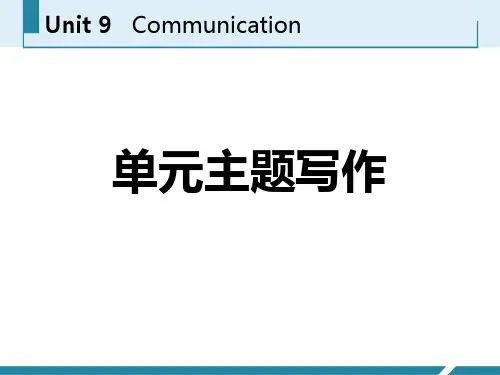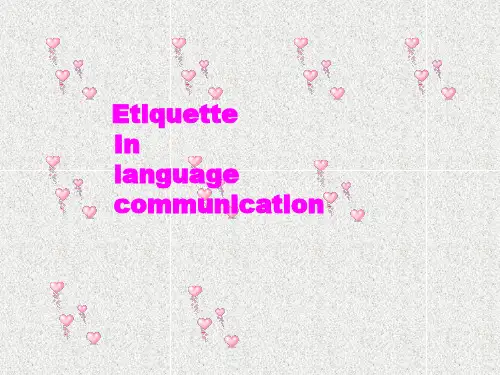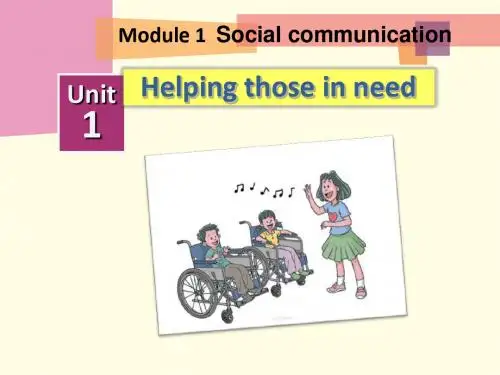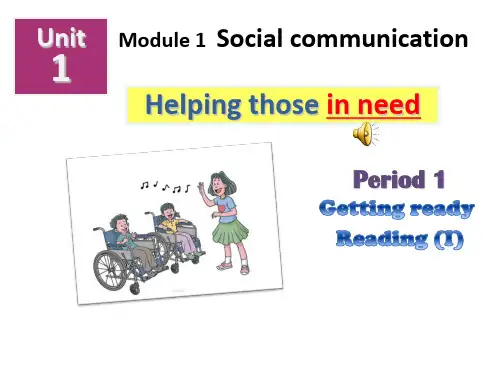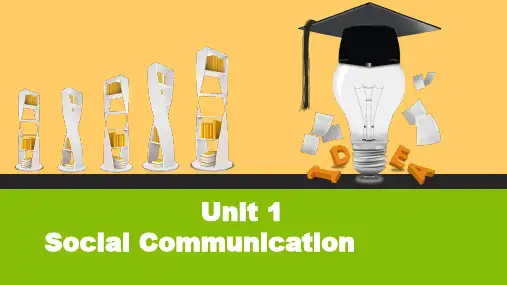unitsocialcommunicationppt课件
- 格式:ppt
- 大小:3.86 MB
- 文档页数:12
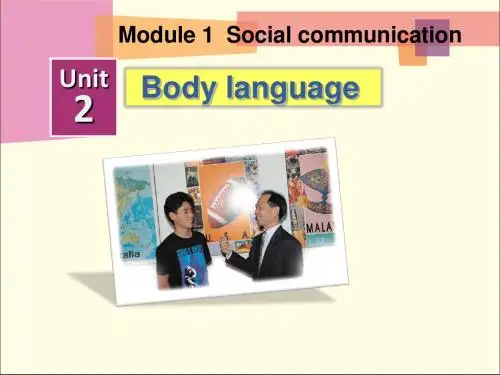
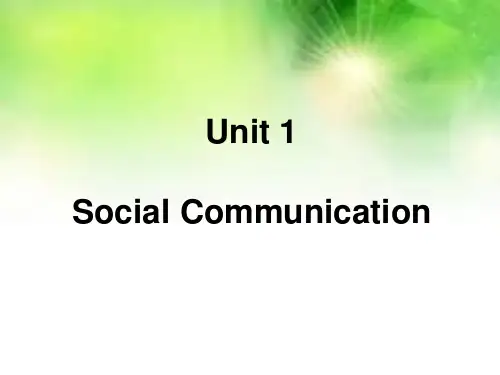
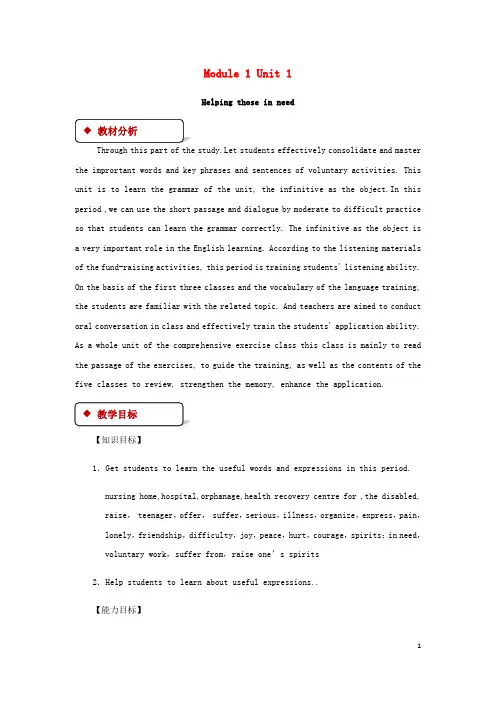
Module 1 Unit 1Helping those in need◆教材分析Through this part of the study.Let students effectively consolidate and master the imprortant words and key phrases and sentences of voluntary activities. This unit is to learn the grammar of the unit, the infinitive as the object.In this period ,we can use the short passage and dialogue by moderate to difficult practice so that students can learn the grammar correctly. The infinitive as the object is a very important role in the English learning. According to the listening materials of the fund-raising activities, this period is training students' listening ability. On the basis of the first three classes and the vocabulary of the language training, the students are familiar with the related topic. And teachers are aimed to conduct oral conversation in class and effectively train the students' application ability. As a whole unit of the compre hensive exercise class this class is mainly to read the passage of the exercises, to guide the training, as well as the contents of the five classes to review, strengthen the memory, enhance the application.◆教学目标【知识目标】1.Get students to learn the useful words and expressions in this period.nursing home,hospital,orphanage,health recovery centre for ,the disabled, raise, teenager,offer, suffer,serious,illness,organize,express,pain,lonely,friendship,difficulty,joy,peace,hurt,courage,spirits;in need,voluntary work,suffer from,raise one’s spirits2.Help students to learn about useful expressions..【能力目标】To be able to read a short passage and answer some question.【情感目标】1.Help them understand more about voluntary work.2.Develop students' sense of cooperative learning.【教学重点】How to train their ability step by step.【教学难点】1.Develop students' ability.2.Help students understand the difficulties.Multimediastep1 Getting ready1.1) Look at the cartoon and answer the questions.What did Hi mean by his words?What did Lo do?Did Lo understand what Hi mean?2) Think and sayWhat is voluntary work?step2. Brainstorm1)Brainstorm1Have you ever done any voluntary work ?Where can we do voluntary work ?nursing homehospitalorphanagehealth recovery centre forthe disabled2)MatchWhat kind of people can we help at these places?nursing home people who have difficulty moving, seeing, hearing, etc. orphanage the oldhospital people who are badly illhealth recovery centre for the distabled children without parents3)Brainstorm 2How can we do voluntary work ?help old peoplehelp raise moneyvisit sick children in a hospital4).What do you know about … ?There are many kinds of voluntary work. Can you match the activities with the Pictures below? Write the correct letters in the boxes.a helping disabled peopleb helping raise moneyc visiting an oid people’s homed visiting sick children in a hospitalstep3. Before you read1).Read the title, introduction and the writers’ names on page 3. Then answer the following questions.What are the names of the three teenagers?What did they offer to do during the school holidays?2).Look at the pictures, the writers’ names and the first sentence of each report on page 3. Write the correct names in the blanks.1. I talked to chidren without parents.2. I helped sick children .3. I taught disabled children to sing.I did some voluntary work in a chidren’s hospital.There are many children without parents.I wanted to help disabled children.Step4. While you read1.Read the first paragraph of Betty’s report and answer the following.I did some vountary work in a children’s hospital.The children there all suffer from serious illnesses.We organized a painting competition for them.Where did Betty do voluntary work?What is wrong with the children there?What did Betty and other volunteers do for the children?2.Read the first paragraphs of Mark’s and Annie’s reports and complete thetables.There are many children without parents.I met some of these children with my mother. We taught them to tell stories. This helps them express their feelings. One child said,"My friends don't understand my pain".I wanted to help disabled children.They have difficulty walking or moving.I taught them to sing because music can bring them joy and peace.3.Mark’s voluntary work4.Annie’s voluntary work5.Read th e second paragraph of Betty’s report and answer the questions.voluntary work, in the future.Whom did Betty help the most、What did Cindy want to do?How did Betty help Cindy?6.Read the second paragraphs of Mark’s and Annie’s reports and complete the sentences.We spent some time with a girl called Vivien.Her parents died in a car accident, and she is unhappy and very lonely.She needs friendship.My mother and i will continue to visit Vivien.I met a boy called Tim.He hurt his legs in an accident,but he has lots of courage. we need to help children like Tim and raise their spirits.I will continue to do voluntary work, in the future.Step5. After you readRead the passage aloud.Three teenagers offered to do some voluntary work during the school holidays. They wrote the following reports.I did some voluntary work in a children’s hospital. The child ren there all suffer from serious illnesses. We organized a painting competitio n for them.I met a girl called Cindy. She wanted to paint a picture of the park near her home.I went there and took some photos of it. Cindy used them for her painting.Betty There are many children without parents. I metsome of these children with my mother. Wetaught them to tell stories. This helps them express their feelings. One child said, “Myfriends don’t understand my pain.”We spent time with a girl called Vivien. H er parents died in a car accident, and she is unhappy and very lonely. She needs friendship. My mother and I will continue to visit Vivien.MarkI wanted to help disabled children. They have difficulty walking or moving.I taught them to sing because music can bring them joy and peace.I met a boy called Tim. He hurt his legs in an accident, but he has lots of courage. We need to help children like Tim and raise their spirits. I will continue to do voluntary work in the future.Annie Step6. VocabularyC1 The words in italics are from the reports on page 3. Circle the correct answers to complete these sentences.1. When spmething is serious,it is .a bad or dangerousb good or safe2. If you have an illness ,you are a person .a in good healthb in bad health3. If you have an illness ,you are .a nervousb not worried or excited4.A person with courage is usually of something dangerous or difficult.a afraidb not afraid5 If you raise something ,you .a make it lowerb move it higher6 If you are in high spirits,you have a good .a feelingb abilityStep7. Homework1.抄写单词和短语:raise,disabled,teenager,offer, suffer,serious,illness,organize,express,pain,lonely,friendship,difficulty,joy,peace,hurt,courage,spirits;in need,voluntary work,suffer from,raise one’s spirits。

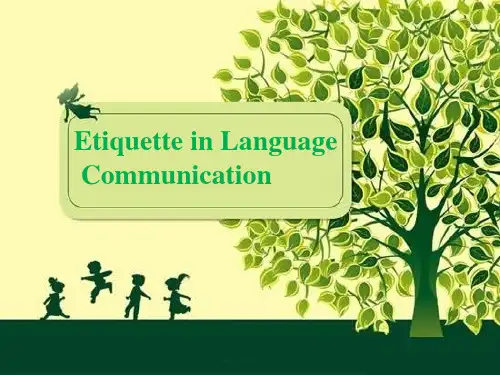
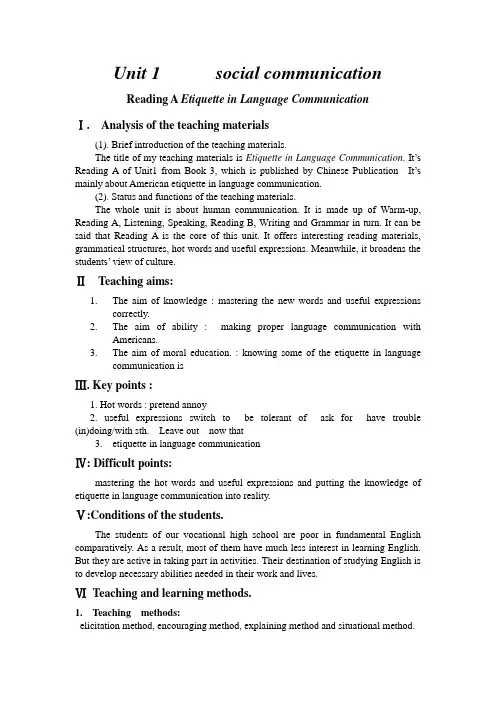
Unit 1 social communicationReading A Etiquette in Language CommunicationⅠ. Analysis of the teaching materials(1). Brief introduction of the teaching materials.The title of my teaching materials is Etiquette in Language Communication. It’s Reading A of Unit1 from Book 3, which is published by Chinese Publication It’s mainly about American etiquette in language communication.(2). Status and functions of the teaching materials.The whole unit is about human communication. It is made up of Warm-up, Reading A, Listening, Speaking, Reading B, Writing and Grammar in turn. It can be said that Reading A is the core of this unit. It offers interesting reading materials, grammatical structures, hot words and useful expressions. Meanwhile, it broadens the students’ view of culture.ⅡTeaching aims:1.The aim of knowledge : mastering the new words and useful expressionscorrectly.2.The aim of ability : making proper language communication withAmericans.3.The aim of moral education. : knowing some of the etiquette in languagecommunication isⅢ. Key points :1. Hot words : pretend annoy2. useful expressions switch to be tolerant of ask for have trouble (in)doing/with sth. Leave out now that3. etiquette in language communicationⅣ: Difficult points:mastering the hot words and useful expressions and putting the knowledge of etiquette in language communication into reality.Ⅴ:Conditions of the students.The students of our vocational high school are poor in fundamental English comparatively. As a result, most of them have much less interest in learning English. But they are active in taking part in activities. Their destination of studying English is to develop necessary abilities needed in their work and lives.ⅥTeaching and learning methods.1. Teaching methods:elicitation method, encouraging method, explaining method and situational method.2. learning methods :3. exploring, participating and practicing methodsⅦ: Teaching Design:carry on this lesson in six steps: lead-in, fast reading, intensive reading, practice, summary and homework, which take 2 minutes, 5 minutes, 20 minutes, 15 minutes, 2 minutes and 1 minutes respectively. Before I end this part, I’d like to display my design of writing on the blackboard.Ⅷ Teaching procedure:Step 1 Lead in (2’)Tell a story , showing some pictures with wrong manners → Find mistakesThen ask the question: “What are wrong manners?”The students needn ’t answer the questionStep 2 fast reading (5)read fast → showing the pictures again → give their answersThen ask the question: “What we should say/do here?”× ① ×② × ③ ×④Step 3 Intensive reading (20)1. read carefully ,then ask the question: “Why should we behave so?”2. key words and useful expressions → long sentences → expansionKey words and expressions:ok ① ok②?①? ② ? ④ ?③③ ok ③ ok④In this step, I’ll take three steps to present the key words and useful expressions. First, the usage. Then, show one or two model sentences. Last, to get the students to participate and practise, give them one or two sentences as exercises. The exercises can be in different forms, such as, filling in blanks, translating, correcting mistakes, and so on. All the exercises are done by the students themselves.be tolerant of/towards:Usage: be tolerant of/towards +n./ pron .Model sentences:1.Mr. Smith is not very tolerant of/towards others .2.We should always be tolerant of the views of others even if we disagree withthem.Exercises:1.Fill in the blank with the right form of the given words:Her own mistakes made her very____( tolerant) of/towards others.Have some/no trouble(in)…Usage: have some/no trouble(in) doing sth.Model sentences:I had some trouble (in) reading the letter . His handwriting is very bad.They had no difficulty in understanding what he said.Exercises:Translate the Chinese sentence into English:他们毫不费力就找到了我的家。
